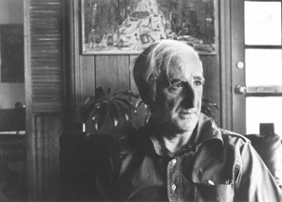
Ben H. Bagdikian
Professor of Journalism, Emeritus
Hidden in saddlebags on the back of a donkey, Ben Haig Bagdikian escaped the Armenian genocide to flee to safety in the United States. After settling in America, he went on to become one of the most influential reporters, editors, media critics and journalism educators of the twentieth century.
As an assistant managing editor at The Washington Post in the 1970s, Bagdikian (January 30, 1920 - March 10, 2016) played a key role in that newspaper’s coverage of the Watergate break-in as well as the publication of the Pentagon Papers. Steven Spielberg’s film The Post (2017) features the taller actor Bob Odinkirk portraying Bagdikian, who was actually a wiry five-foot six.
Bagdikian’s insider’s view of the interplay of politics, press and power gave him a vantage point few other media critics could match. He also had a strong sense of morality and fair play, perhaps influenced by his father, who was pastor of an Armenian Congregational Church in Cambridge, Massachusetts.
Bagdikian took a dim view of the slow but unstoppable acquisition of American newspapers by giant corporations. His 1983 book The Media Monopoly warned of the dire consequences to democracy of big companies taking over the media industry. His latest edition of the book was published in 2004. But his was a voice crying in the wilderness.
The New York Times made this observation about Bagdikian’s predictions: “Journalists, scholars, corporate officials and the public still debate the drawbacks and merits of limited media ownership. But the Internet and desktop publishing have extended freedom of speech to anyone with a computer. Cable networks and online news and entertainment choices have proliferated, and some observers contend that the Orwellian perils envisioned by Mr. Bagdikian have receded or become moot.” Nevertheless, the consolidation trend proceeded, accelerated by the Telecommunications Act of 1996, which allowed media companies to increase their hold over the news industry. Six companies now control 90 percent of U.S. media outlets. The newer technologies, such as the Internet, have “disrupted” the traditional news organization. Today’s political-media landscape has a lot in common with Bagdikian’s prophetic vision of dystopia.
He was a professor at the University of California, Berkeley’s Graduate School of Journalism from 1976 until his retirement in 1990. His renowned course on ethics in journalism was a staple of the curriculum. He served as dean from 1985 until 1988, when he stepped down for reasons of health.
His longtime friend Lissa Muscatine, made this observation at Ben’s memorial service: “Every young person who crossed Ben’s path seemed to be drawn to him. Because Ben wasn’t just some wise old man. He was an older person who still felt hope about the world, who saw in young people the possibility that things could and would be better, who delighted in the realization that another generation was eager to carry the torch onward in an uncertain world. He was a critic — but not a cynic. Ben never stopped believing in life’s boundless possibilities. And he never stopped sharing his generous, compassionate, and hopeful spirit with those of us who were lucky enough to have him in our lives.”
He was in the dean’s chair when the journalism school made the fateful changeover from electric typewriters and hard copy to computers. He did not welcome this move. He argued that the faculty ought to be teaching basic reporting skills and critical thinking, instead of training young reporters to be “computer jockeys.” But the faculty proceeded down the technology road, as did every other journalism organization. And the right balance between tech and fundamentals continues to be debated.
Bagdikian also was dismayed by the trend of making journalists into celebrities. His New York Times obituary has this quote from 1997: “The worst thing that can happen to a journalist is to become a celebrity. The honest job of the journalist is to observe, to listen, to learn. The job of the celebrity is to be observed, to make sure others learn about him or her, to be the object of attention rather than an observer.”
As a professor, Bagdikian served as a member of the Berkeley Division of the Academic Senate’s Committee on the Status of Women and Ethnic Minorities (1978-80, 1981-82). He was ahead of his time in calling attention to the impact of incarceration. Bagdikian is surely the only Berkeley professor to be pictured on a book cover as a convicted criminal, about to be locked up, the identity he assumed for Caged: Eight Prisoners and their Keepers (1976).
Earlier in his career as a writer for The Saturday Evening Post he had reported on the plight of black sharecroppers in the South. He prided himself not only in researching the facts and talking to experts, but in immersing himself into the story. In that capacity, in 1969 he moved into the home of a black sharecropper in Cleveland, Mississippi, ate their food and almost became a member of the family. The white boss got wind of this and feared that Bagdikian was some kind of union organizer. So he ordered the family off the land. The head of the family, Walter Austin, moved to Illinois. Bagdikian stayed in touch with the family for years afterward until Walter’s death. “I lived with the memory of a hero, Walter Austin,” Bagdikian later wrote.
Ben is survived by his wife Marlene Griffith Bagdikian and a son, Frederick.
William Drummond
2018
